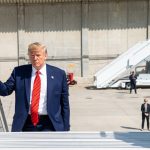In a bold move that could significantly shake up the global economic landscape, President Trump is preparing to announce new tariffs targeting a variety of imports from Europe. Vice President J.D. Vance recently shared details on Trump’s plans, emphasizing a strategy aimed at reducing the country’s $36 trillion national debt while tackling what he describes as unfair trade practices that have long disadvantaged American industries. This announcement, expected soon, could prove to be a game-changer, particularly for the U.S. auto industry, which has struggled due to steep foreign tariffs.
Reports suggest the new tariffs will include reciprocal measures against European imports, designed to level the playing field for American businesses. Currently, American-made cars face a hefty 30% tariff when trying to enter European markets, while European cars sold in the United States face only 2.5% duties. This imbalance has made it difficult for American automakers to compete, resulting in the loss of countless jobs in the sector. The Trump administration plans to address this disparity directly, advocating for fairer trade practices that will benefit American workers and companies.
The impact of European policies extends beyond the auto industry. American tech companies have also been under pressure, facing fines and heavy taxation, which ultimately affect consumers and job security. In a clear response to what he believes are predatory foreign practices, President Trump is determined to push for reforms that will protect American interests and ensure domestic businesses are no longer treated as cash cows for foreign governments.
But tariffs aren’t the only significant focus of Trump’s administration. Reports indicate that some government programs may not be effectively serving the American public. Taxpayer dollars, it appears, have been funneled into questionable initiatives, including funding radical left-wing projects abroad, sparking concerns about accountability and oversight. Critics have argued that these funds are being used as slush funds for causes unrelated to the core interests of American citizens, such as controversial policies and programs that have little to do with national security or prosperity.
As Trump prepares to unveil his economic plan, a central focus remains on restoring power to the American people. His administration is determined to dismantle what it sees as an unaccountable bureaucracy operating beyond the reach of voters. By reinstating oversight and increasing transparency in executive actions, the goal is to create a system that better serves the public rather than a privileged few. This includes reviewing who has access to sensitive government data, and ensuring these resources aren’t being weaponized against ordinary citizens.
In summary, President Trump is positioning himself to tackle both international trade imbalances and questionable government spending with a clear focus on fairness and accountability. His efforts to push back against unfair foreign trade practices and cut wasteful government programs are aimed at securing a more prosperous future for American workers and businesses. As further announcements loom, the nation waits in anticipation to see how these proposed changes will reshape the economic landscape and help restore American greatness.




